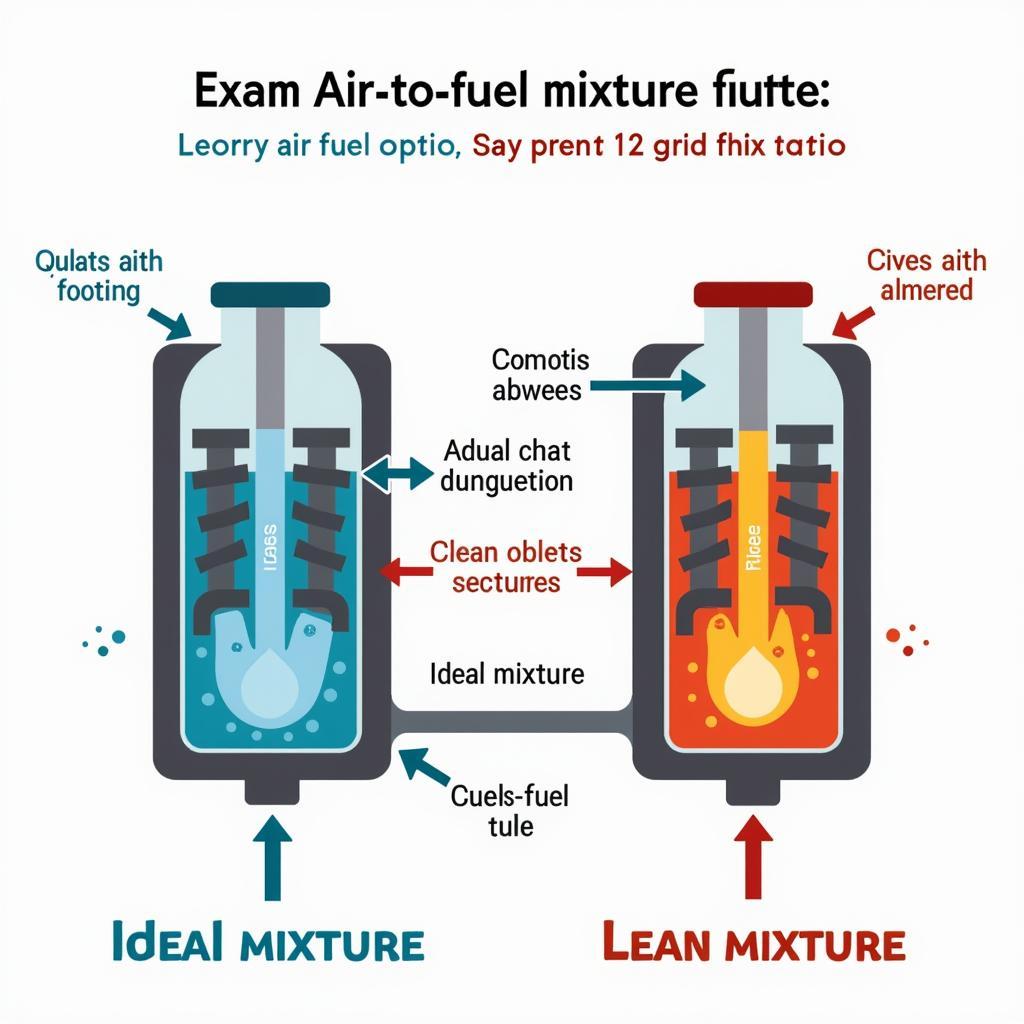Your cart is currently empty!

Understanding and Resolving the 17965 Fault Code in Your VW Sharan
The dreaded 17965 fault code – a common sight for many Volkswagen Sharan owners. This code, often accompanied by an illuminated check engine light, can signal a frustrating and potentially costly issue with your vehicle. But don’t worry, this article will guide you through understanding, diagnosing, and potentially fixing the 17965 fault code in your VW Sharan.
What Does the 17965 Fault Code Mean?
In technical terms, the 17965 fault code translates to “P1557 – Long Term Fuel Trim: System Too Lean – Bank 1.” This essentially means that the engine control unit (ECU) is detecting that the air-fuel mixture in your engine is too lean, meaning there’s too much air compared to fuel. This can happen due to a variety of reasons, which we will discuss in detail further down.
 Lean Air-Fuel Mixture in Car Engine
Lean Air-Fuel Mixture in Car Engine
Common Causes of the 17965 Fault Code in VW Sharan
While the 17965 fault code points to a lean air-fuel mixture, there can be several culprits behind this imbalance. Some of the most common causes in VW Sharan models include:
- Vacuum Leaks: One of the most frequent reasons for a lean mixture, vacuum leaks occur when air bypasses the engine’s intended intake path. This disrupts the precisely calculated air-fuel ratio.
- Faulty Mass Air Flow (MAF) Sensor: The MAF sensor measures the volume of air entering the engine. A malfunctioning sensor can send incorrect data to the ECU, leading to an improper fuel mixture.
- Malfunctioning Oxygen (O2) Sensor: O2 sensors monitor the oxygen content in the exhaust gases to fine-tune the air-fuel ratio. A faulty O2 sensor can misinterpret the exhaust composition, resulting in a lean mixture.
- Fuel Delivery Problems: Issues like a clogged fuel filter, failing fuel pump, or malfunctioning fuel injectors can restrict the amount of fuel reaching the engine, causing a lean condition.
- Exhaust Leaks: Similar to vacuum leaks, exhaust leaks, particularly before the O2 sensors, can disrupt the sensor readings and lead to an incorrect air-fuel mixture.
Diagnosing the 17965 Fault Code
Accurately diagnosing the root cause of the 17965 code requires a systematic approach. Here’s a step-by-step guide:
- Read the Fault Codes: Begin by connecting an OBD-II scanner to your VW Sharan’s diagnostic port. This will reveal the 17965 code, and it might show additional codes that provide further clues.
- Inspect for Vacuum Leaks: Thoroughly examine all vacuum hoses connected to the intake manifold, throttle body, and other related components. Look for cracks, loose connections, or signs of deterioration.
- Check the MAF Sensor: Locate the MAF sensor in the air intake tract. Inspect it for dirt or debris and clean it if necessary. You can also test its functionality using a multimeter.
- Inspect the O2 Sensors: Your VW Sharan has multiple O2 sensors. Use a multimeter to check their voltage readings and compare them to the manufacturer’s specifications.
- Examine Fuel Pressure and Delivery: Connect a fuel pressure gauge to the fuel rail to measure fuel pressure. Inspect the fuel filter and consider replacing it if it appears clogged.
“A thorough inspection is crucial,” says Michael Becker, Senior Automotive Engineer at VCDSTool. “Don’t jump to conclusions based on a single symptom. Use a methodical approach to pinpoint the exact cause of the 17965 code.”
Resolving the 17965 Fault Code
Once you’ve identified the culprit behind the 17965 fault code, take the following steps to resolve it:
- Repair Vacuum Leaks: Replace any cracked, loose, or damaged vacuum hoses with high-quality replacements. Ensure all connections are secure.
- Replace Faulty Sensors: If you’ve determined that the MAF sensor or any of the O2 sensors are malfunctioning, replace them with new, OEM-quality parts.
- Address Fuel Delivery Issues: Replace a clogged fuel filter or repair/replace a faulty fuel pump. If the fuel injectors are malfunctioning, have them cleaned or replaced by a qualified mechanic.
- Repair Exhaust Leaks: If you discover any leaks in the exhaust system, particularly before the O2 sensors, have them repaired by a professional.
Conclusion
Encountering the 17965 fault code in your VW Sharan can be concerning, but understanding its implications and following a systematic diagnostic approach can help you address the issue effectively. Remember, a lean air-fuel mixture can not only impact your vehicle’s performance and fuel efficiency but also potentially lead to more severe engine problems if left unaddressed.
“Addressing the issue promptly is key,” emphasizes Becker. “Ignoring the 17965 code can exacerbate the problem and lead to costlier repairs down the line.”
If you’re uncomfortable performing the diagnosis and repairs yourself, don’t hesitate to seek assistance from a qualified mechanic or reach out to us at VCDSTool at +1 (641) 206-8880 and our email address: vcdstool@gmail.com. Our team of experts can provide guidance and support in resolving your VW Sharan’s 17965 fault code. We are located at 6719 W 70th Ave, Arvada, CO 80003, USA.
by
Tags:
Leave a Reply